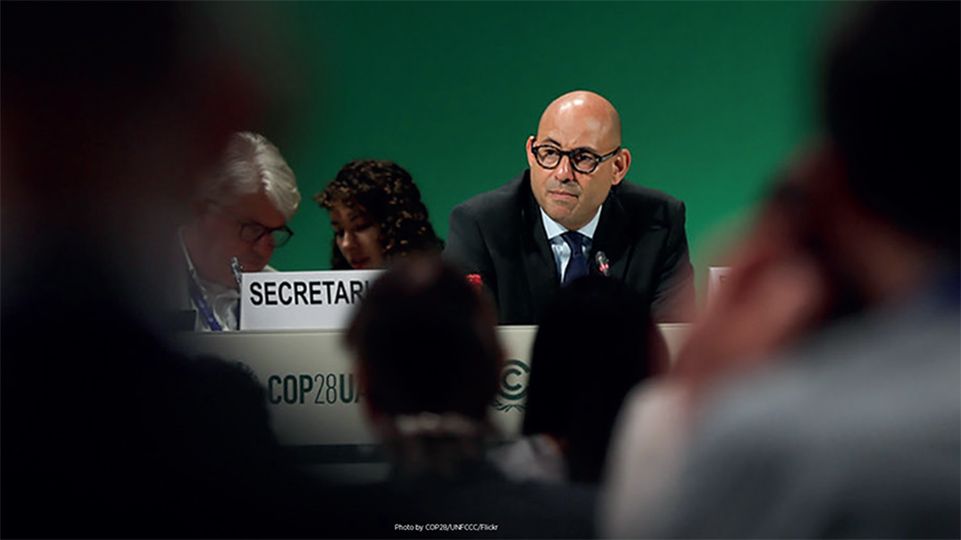In a COP focused on working to find solutions to unlock climate capital for developing nations, rather than making big headline pledges and announcements, investment industry professionals tell ESG Clarity they are looking to get down to the nitty gritty, as long as a stable policy environment can be facilitated.
In this video from Finance Day in Sharm el-Sheikh, Ninety One’s Nazmera Moola, Impax’s Chris Dodwell and Rathbone Greenbank’s Nicola Day discuss the need for blended finance, the shortfalls since COP26 and what they might take back to their firms from COP27.
See also: – All ESG Clarity’s COP27 coverage
The full transcript is below:
NT: It’s the end of Finance Day here at COP27. We haven’t heard the big headline announcements we had last year, but the industry says there’s a reason for that. They’ve been beavering away under the radar and are here to accelerate that. The big theme of today has been how to actually implement those commitments from last year and how to mobilise finance for developing economies.
It’s encouraging to see the industry and policymakers working together but is it enough? Let’s hear what sustainable finance experts from Impax, Ninety One and Rathbone Greenbank have to say about Finance Day.
NM: So last year, Natasha, was about the big announcements. It was the first time the finance sector pitched up at COP in size. It was the first time the US Treasury Secretary had ever been to a COP, so it was about the pledges as it was the largest quantum of capital that would being committed to fighting climate change.
We spent the last year trying to figure out how to do that. And it’s a lot more complex than making the pledge to do it. So what you’re seeing this year is much more granular stuff around how we do this about getting carbon markets functioning on the African continent, about the type of capital flows needed to finance transition across emerging and frontier markets, about how we assess transition in the big developed market countries.
So much less exciting than the pledges of 2021. The other key message is the fact that despite all the pledges, the quantum of money that has flowed to emerging and frontier markets over the last year has been very disappointing. Part of that is the fact that on a cyclical basis you’re in a dollar bull market, which always sucks money out of emerging markets.
The other issue is that we haven’t seen the quantum of money flow to emerging markets that we would hope to see to finance fair transition. We always know that during a period of a dollar bull market, money gets sucked out of emerging and frontier economies. And we’ve seen that this time around. Public markets have seen outflows from equity and debt markets.
But what was particularly disappointing to me was if you looked at the data from convergence they blended finance report for 2022 showed a decline in blended finance flows to emerging markets. And that’s really worrying because that’s where a lot of the transition finance will come from to start developing countries and thinking that people have not lived up to what they said they were going to do in Glasgow.
CD: So there are only 30-odd new NDCs (nationally determined contributions) that have been provided rather than 190, which is what people said they were going to do. And the 100bn hasn’t been achieved. So that’s why we’ve seen this really big push on loss and damage. And I guess that if anything is going to be a new thing that’s going to come out of this, it will probably be something around that to recognise this issue around how do we deal with these impacts where you can’t adapt a way out. The finance sector isn’t going to start to invest in new areas unless they’re comfortable that they’re going to be supportive in stable policy environments to go with them. So what we want to see is a much more sort of recognition that you need the public and the private moving together.
The event last night was organised by the UNFCCC Secretariat. It was the second of a private sector climate finance dialogues. And what was really interesting was that it gave the opportunity to talk to negotiators around what good national policy looks like because you don’t need UN consensus around effectively the investment environment for investors. So the point I was making was that what investors need to see are really clear credible policy, sectoral roadmaps.
We’re fortunate in the UK, we’ve got the Committee on Climate Change that has been doing this kind of approach for some time. They’ve got a really good expression of the amount we need to increase capital flows – we need to basically move from around 10bn a year to something like 50bn a year within the next five years. So that’s a pretty impressive number. But you then need to look under the bonnet to work out which sectors is growing. So in the UK we know that we need to massively invest in our building structure, energy efficiency in buildings. We need to invest in electric vehicles and electric vehicle infrastructure. We need to invest in clean energy so investors have an idea about where those opportunities are going to be, and then they can try and sit down and work with governments on how to address those.
ND: You know, today has been very reassuring. Certainly the meetings that I’ve been in today are looking at all those sorts of coalitions to really mobilise lots of different finance.
And we have to realise that is going to come in lots of different ways. The finance to be able to unlock the potential for setting the developing countries to advance with climate action. So a very interesting meeting I saw this morning was with Professor Stern, where they’ve just had a report on climate financing released, and that was just really showing all the difficulties and challenges with mobilising investment and finance for the developing world.
And one of the key things is that we do need policy to change. We need a really good policy background that investors can feel confidence to invest in. So now that’s why COP27 is so good because we’ve got people at each end of the chain, we’ve got the people with the projects ready and waiting to release those.
And then we’ve got the other end where we have got the people to want to commit funds. But they only want to do it in a way where we do see a lot more sort of standardisation of how is financing instruments will be put together and the and, and the confidence and sort of guarantees with them. So a real focus on de-risking a lot of these investments.
NT: Will there be things that you do straight away when you get back, as we wait for some of these policy developments to take shape?
ND: I think the impact investing market is a really interesting one and one that you know, certainly from here from COP27 we’re hearing is going to get even more interesting.
And if we do have these more secure playing fields in some of these developing countries, in these instruments that we can really take back to our clients. And I think that is going to be interesting. But there’s much more progress to be made on those before they are viable options for sustainable investors.
NT: It does seem to be that that’s one of the main topics of conversation today. So we can just be hopeful, I suppose.




